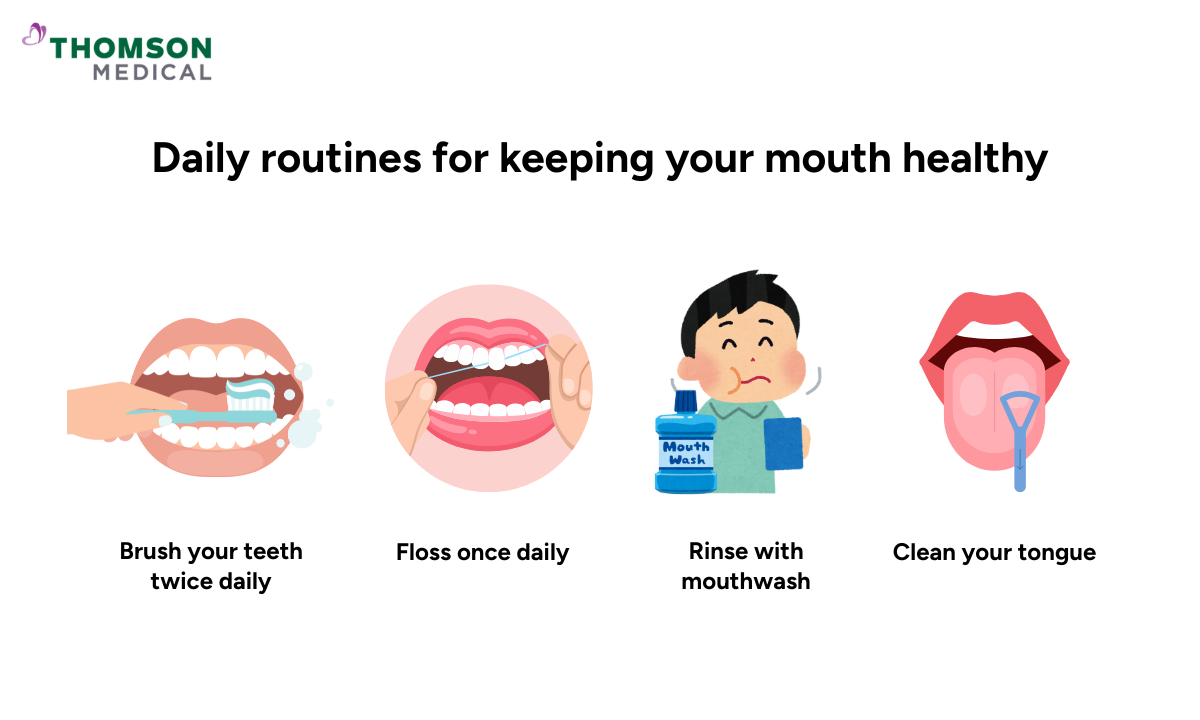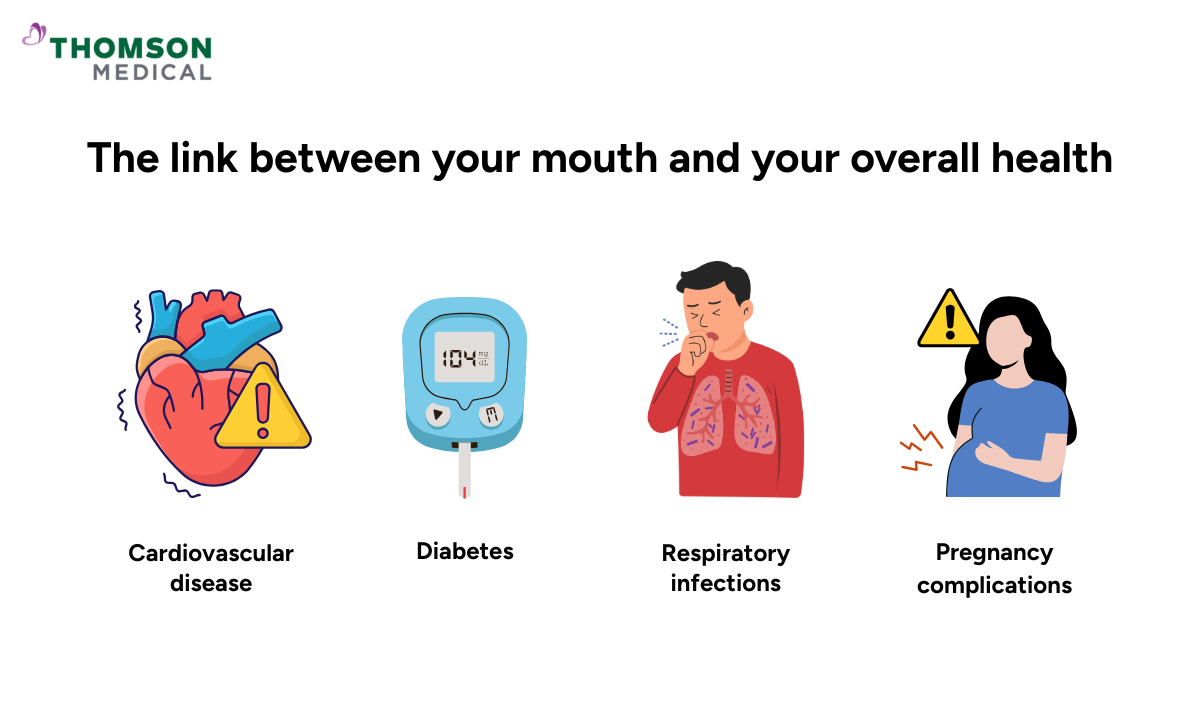Your mouth plays a bigger role in your daily life than you might think. It helps you enjoy your favourite foods, laugh with friends, and feel good when you look in the mirror. However, when something's not quite right, such as when your gums bleed when you brush or you have bad breath, it can affect your confidence.
The good news is that looking after your oral health doesn’t have to be complicated. You don't need expensive products or a complicated routine. Just a few simple habits can make all the difference.
What is good oral hygiene?
Oral hygiene refers to the daily practices that keep your mouth clean and healthy. These habits prevent tooth decay, gum disease, and bad breath.
You might be surprised to learn that what happens in your mouth can affect the rest of your body. If your gums are unhealthy, bacteria can enter your bloodstream and affect other parts of your body, including your heart and lungs.
What are the daily routines for keeping your mouth healthy?

Good oral care begins with a few simple habits that you can easily fit into your daily routine. A consistent routine doesn't have to be complicated.
Brush your teeth twice daily
Brush your teeth twice a day for two minutes each session, ideally after breakfast and before bed. Here are a few important tips to remember:
Choosing your toothbrush:
Pick a soft-bristled toothbrush to protect your gums and enamel (outermost layer of your teeth). Hard bristles can cause damage, especially if you brush too hard.
Replace your brush every 3-4 months, or sooner if the bristles fray.
Selecting toothpaste:
Use fluoride toothpaste to strengthen enamel and prevent cavities.
If your teeth feel sensitive, choose a toothpaste for sensitive teeth to help reduce discomfort.
Floss once daily
Flossing may feel like extra work, especially when you're tired at the end of the day. However, your toothbrush can't reach between your teeth, and that's exactly where bacteria hide. Take about 45 cm of dental floss, wrap it around your fingers, and gently slide it between each tooth. Avoid snapping the floss against your gums, as this can cause injury.
Rinse with mouthwash
Mouthwash isn’t essential but it reaches areas that brushing and flossing might miss. It complements your routine but doesn't replace brushing or flossing. You can find several types of mouthwash:
Antiseptic mouthwash contains ingredients that kill bacteria and reduce plaque
Fluoride mouthwash strengthens enamel and helps prevent cavities
Alcohol-free options are gentler and won't cause burning sensations
Clean your tongue
Bacteria live on your tongue too, and they're often behind persistent bad breath. Just brush it gently when you brush your teeth, or use a tongue scraper if you prefer. Brushing your tongue before bed is especially helpful for cutting down on morning breath.
What are the common dental problems in adults?
As we age, our dental needs naturally evolve. Whilst adults may experience various oral health changes, many can be effectively managed when identified early. Recognising these concerns allows you and your dentist to work together towards maintaining your oral health and comfort.| Dental problem | What it is | What you should know |
|---|---|---|
| Tooth cavities | Holes in the enamel caused by bacteria | Small cavities need fillings. Larger ones may need dental crowns. If decay reaches the nerve, a root canal is needed before restoration |
| Gum disease (gingivitis & periodontitis) | Infection of the gums that can affect the bone | Gingivitis causes red, swollen gums and can be reversed with cleaning and good care. Advanced gum disease may need deep cleaning, medicine, or surgery |
| Tooth sensitivity | Sharp pain from hot, cold, sweet, or acidic foods | Often due to worn enamel or receding gums. See a dentist if pain persists to rule out cavities or cracks |
| Dry mouth | Reduced saliva flow | Common with age or medication use. Drink more water, chew sugar-free gum, and ask your dentist about saliva substitutes if needed |
| Orthodontic issues | Crooked or misaligned teeth | Harder to clean and may wear unevenly. Braces or clear aligners can help straighten teeth and improve your bite |
| Missing teeth | Gaps caused by tooth loss | Can be replaced with dental implants, bridges, or dentures to restore function and appearance |
While these conditions may sound concerning, remember that most dental problems are highly treatable when caught early. Your dentist can help you address any of these issues and guide you toward the right treatment for your situation.
Our dentist
Loading...
How often should you do a dental visit?
You should see your dentist at least twice yearly for check-ups and dental scaling. During these visits, the dental hygienist will remove tartar and plaque that brushing and flossing can't eliminate. Your dentist will also examine your teeth, gums, and oral tissues to identify early signs of decay, gum concerns, or other conditions that may need attention.
Depending on your individual oral health needs, some people need more frequent dental check-ups. If you have gum disease, frequent cavities, or other risk factors, your dentist may recommend appointments every three to four months.
If you're unsure when your last check-up was or have questions about your dental health, our dentist at Thomson Dental Centre is here to help. Schedule your appointments with us today and we'll be ready to help you take the next step towards maintaining your smile and oral wellbeing.
What is the link between your mouth and your overall health?

Bacteria from gum disease can enter your bloodstream and contribute to problems elsewhere in your body. Poor oral health is linked to several conditions:
Gum infections can raise the risk of cardiovascular disease such as heart problems, blocked arteries and stroke
Poor oral health can make diabetes and blood sugar harder to control
Bacteria from your mouth can reach your lungs and cause illnesses like pneumonia
Severe gum disease can be linked to early birth and babies with low birth weight
Taking care of your oral health supports your general wellbeing and may reduce your risk of these conditions.
How can you prevent dental problems?
Prevention is easier than treatment. These simple practices can make a big difference:
Maintain your daily brushing and flossing routine consistently
Limit sugary and acidic foods and drinks
Don't smoke or use tobacco products
Wear a mouthguard if you play contact sports or grind your teeth at night
Stay hydrated throughout the day
Visit your dentist regularly for check-ups and cleanings
Address small problems before they worsen
Taking care of your oral health can feel overwhelming, especially if you're dealing with existing concerns. If you'd like someone to walk you through your options or answer your questions, schedule an appointment at Thomson Dental Centre. Our dentist can help to provide tailored dental treatment based on your condition.
FAQ
What are the signs of poor oral hygiene?
Watch for persistent bad breath, gums that bleed when you brush or floss, teeth that feel loose, or pain when you eat hot or cold foods. If something doesn't feel right, get it checked. Early attention prevents bigger problems.
Is brushing three times a day too much?
Not at all. Brushing after meals provides extra protection. Just be sure to use gentle pressure with a soft-bristled brush. Brushing harder doesn't mean cleaner teeth; it means potential damage to your gums and the protective layer on your teeth.
Can gum disease be reversed?
If caught early, you can reverse it with better oral care and professional cleaning. Once it advances to affect the bone supporting your teeth, you can't reverse the damage, but you can stop it from progressing with proper treatment.
Can smoking affect oral health?
Smoking increases your risk of gum disease, tooth loss, and oral cancer. It stains your teeth, causes persistent bad breath, and slows healing after dental procedures. Quitting tobacco improves your oral health significantly.
How can you check for oral health problems at home?
Yes. Once a month, stand in front of a mirror in good lighting and look inside your mouth. Check for sores that haven't healed within two weeks or unusual white, red, or dark patches on your gums, tongue, or inner cheeks. Also look for lumps, thickened areas, or areas that feel persistently painful or numb. If you notice any changes or have trouble chewing or swallowing, schedule a visit with your dentist.
Should I brush my teeth immediately after eating?
It's actually better to wait about 30 minutes after eating before you brush, especially if you've had acidic foods or drinks like citrus fruits or soda. These foods temporarily soften the protective layer on your teeth, and brushing right away can wear it down. If you want to freshen your mouth after eating, rinse with water or chew sugar-free gum instead. Then brush after the half-hour when your teeth have had time to recover.
The information provided is intended for general guidance only and should not be considered medical advice. For personalised recommendations and tailored advice based on your unique situations, please consult a specialist at Thomson Medical. Schedule an appointment with Thomson Medical today.
